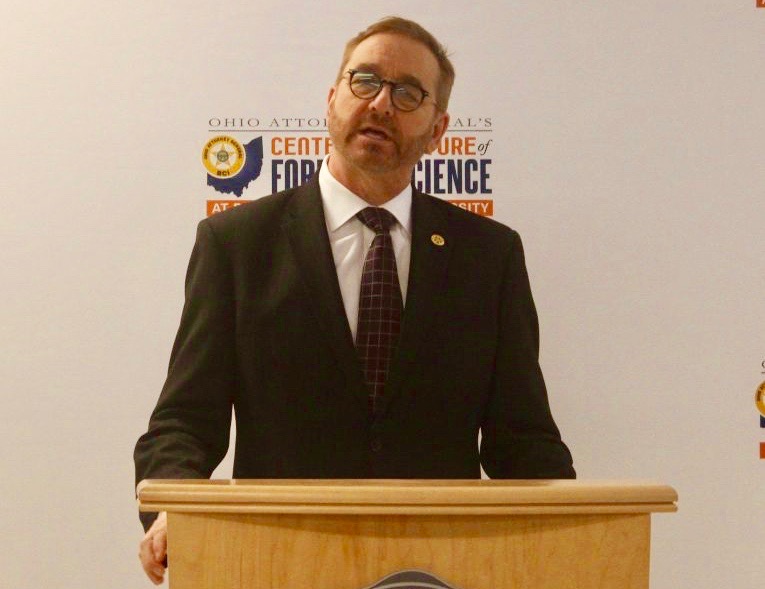By Tyler Buchanan & Daniel Newhauser
Ohio Attorney General Dave Yost is taking legal action in opposition to a provision in the federal COVID-19 package restricting local governments in how they can spend the upcoming relief funding.
The American Rescue Plan Act, signed into law by President Joe Biden last week, allocates $350 billion to states, localities, tribes and territories throughout the United States. This money is meant to mitigate budget losses during the pandemic and also serve as stimulus funds for the years ahead.
As the Ohio Capital Journal reported Wednesday, this funding can be spent on COVID-19 needs; investments in local small businesses and nonprofits; offering premium pay to local “essential workers”; and infrastructure projects, such as water, sewer and broadband improvements.
There are, however, some restrictions: The money cannot go toward funding pensions or to offset tax cuts.
Yost believes the latter restriction is unconstitutional and characterizes the funding as a “coercive offer.” States have the “sovereign authority” to reduce taxes if they wish, Yost argued.
“The federal government should be encouraging states to innovate and grow business, not holding vital relief funding hostage to its preferred pro-tax policies,” Yost stated in a news release.
Yost filed a motion in the U.S. District Court of Southern Ohio seeking a preliminary injunction to prohibit enforcement of the stimulus funding restrictions. The filing requests a ruling by May 1.
The relief plan calls for allocating 50% of the local government funding within 60 days of it being enacted and the other 50% a year later.
The Ohio Capital Journal published estimates of how much the state of Ohio; the 88 counties; and each incorporated community is set to receive.
Meanwhile, Republican attorneys general from 21 states, in a letter to the Treasury Department, threatened to also take action against the Biden administration over the law’s tax cut provision. The group includes attorneys general from Arizona, Florida, Georgia, Kansas, Louisiana, Missouri and Montana.
They are criticizing the same section of the bill as Yost.
In the sharply worded, seven-page letter to Treasury Secretary Janet Yellen, the attorneys general called for federal officials to clarify that a range of tax scenarios would be allowable, and that the provision will be interpreted only to ban the express use of the federal dollars for direct tax cuts.
The state officials set a deadline of March 23 to receive such assurance, vowing that they would otherwise “take appropriate additional action to ensure that our states have the clarity and assurance necessary to provide for our citizens’ welfare through enacting and implementing sensible tax policies, including tax relief.”
Republicans in Washington and state capitals have criticized the provision as an unprecedented string attached to the federal dollars. Idaho’s two GOP U.S. senators have introduced a bill to repeal that section of the law.
Democrats have defended the tax cut language as necessary to keep states from voluntarily reducing their revenues, but Republicans argue they went too far.
“Congress should have no say or control over Missouri’s ability to cut taxes, and the American Rescue Plan should not hinder Missouri’s ability to cut taxes,” state Attorney General Eric Schmitt said in a statement.
He added that the attorneys general’s aim was to “get a clarification from the Treasury Department and ensure that the federal government isn’t overreaching into state tax policy.”
The conservative Heritage Foundation has gone so far as to call on states to reject the federal assistance, a stance that the GOP attorneys general described in their letter as unlikely to occur.
The White House has defended the provision, which was added during Senate consideration at the same time as a prohibition on states using the dollars to shore up pension funds.
Press Secretary Jen Psaki said during her press briefing Monday that “the original purpose of the state and local funding was to keep cops, firefighters, other essential employees at work and employed, and it wasn’t intended to cut taxes.”
In Tuesday’s letter, the GOP attorneys general blasted the provision’s scope as “unclear, but potentially breathtaking.” They argue the section could be read to prohibit any tax cuts, even if those changes are unrelated to the federal aid dollars.
“After all, money is fungible, and states must balance their budgets,” the letter argues. “So, in a sense, any tax relief enacted by a state legislature after the state has received relief funds could be viewed as ‘using’ those funds as an ‘offset’ that allows the state to provide that tax relief.”
The letter lists examples of tax changes already underway or under consideration in a number of states that they argue could potentially force a state to have to repay the federal dollars, including proposals in Arizona and Georgia.
Kansas also is weighing changes to its income tax, along with property or income tax deferrals or credits to small businesses affected by the pandemic, the letter notes. It also cites proposals in Montana to tweak income taxes and education tax credits.
“Not one of these common changes to state tax policy has any real or direct connection to the state’s potential receipt of COVID-19 relief funds, yet each of them could be deemed a tax ‘rebate,’ ‘deduction,’ ‘credit,’ or ‘otherwise’ that could result in a ‘reduction in the net tax revenue’ of the state,” the letter argues.
Treasury officials did not respond to a message seeking comment.
But agency spokeswoman Alexandra LaManna defended the provision to the New York Times, telling the paper that it is “well established” that Congress can set requirements on how states spend federal dollars.
“The law does not say that states cannot cut taxes at all, and it does not say that if a state cut(s) taxes, it must pay back all of the federal funding it received,” LaManna told the New York Times.
“It simply instructed them not to use that money to offset net revenues lost if the state chooses to cut taxes. So if a state does cut taxes without replacing that revenue in some other way, then the state must pay back to the federal government pandemic relief funds up to the amount of the lost revenue.”
***
Also from Ohio Capital Journal:
Speaker Cupp: Still no plans to hold vote to expel Rep. Householder
It has been 240 days since former House Speaker Larry Householder was arrested for his alleged involvement in a bribery and money-laundering scheme.
Yet the Perry County Republican remains in office as a state representative. And it does not appear his status as an active legislator will change any time soon.
Republicans in the Ohio House of Representatives met privately on Tuesday evening to discuss a possible vote to expel Householder from the state legislature while his trial remains pending. Householder has pleaded not guilty.
A lawmaker can be expelled from the chamber with a two-thirds vote.
Current Speaker Bob Cupp, R-Lima, declined to offer any details of the caucus conversation from the night before. Cupp said he had no update to share about Householder’s future in the chamber, just as the House leader had no update last week, the week before that, the week before that or the week before that. READ MORE
Senate bill would ban transgender student athletes from women’s sports
An Ohio state Senator introduced legislation Tuesday that would prevent transgender girls and women from participating in women’s sports at state K-12 schools and universities.
Senate Bill 132, sponsored by Sen. Kristina Roegner, R-Hudson, would require schools to separate student athletics by sex, not gender. The legislation would apply to public schools as well as public and private colleges and universities.
If a participant’s sex is “disputed,” as the bill states, the student athlete must present a signed physician’s statement indicating his or her sex based on:
- The student athlete’s “internal and external reproductive anatomy”
- The participant’s “normal endogenously produced levels of testosterone”
- An analysis of the athlete’s “genetic makeup.”
The bill also contains a provision to protect athletes from “retaliation or other adverse action” after reporting a violation. It would grant them a cause of action for injunctive relief, damages, and more. READ MORE





